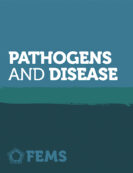FEMS Yeast Research Poster Prize: Ewout Knibbe
We send our congratulations to Ewout Knibbe, who won one of the Poster Prizes at ICY15 meets ICYGMB30, sponsored by FEMS Yeast Research. Ewout’s poster was titled “Full humanization of the glycolytic pathway in Saccharomyces cerevisiae“.
 The 15th International Congress on Yeasts (ICY) and the 30th International Conference on Yeast Genetics and Molecular Biologs (ICYGMB30) was held online from August 23 to 27, 2021. To mark this occasion, FEMS Yeast Research will publish a Thematic Issue to coincide with the conference titled “The Spirit of Yeast: ICY15 meets ICYGMB30“.
The 15th International Congress on Yeasts (ICY) and the 30th International Conference on Yeast Genetics and Molecular Biologs (ICYGMB30) was held online from August 23 to 27, 2021. To mark this occasion, FEMS Yeast Research will publish a Thematic Issue to coincide with the conference titled “The Spirit of Yeast: ICY15 meets ICYGMB30“.
Read our interview with Ewout about his research below:
What is your current position, and what was your scientific journey to get there?
I am currently finishing my PhD at the Industrial Microbiology section, part of the Biotechnology department of Delft University of Technology. My bachelor and master were in Life Science & Technology at the TU Delft and Leiden University. I did my master thesis in the Industrial Microbiology section with Jean-Marc Daran working on chromosomal copy number variations in brewing yeasts and really enjoyed both the atmosphere in the group and the science being done, so when a PhD position in synthetic biology opened up with Pascale Daran-Lapujade I applied and got to work with yeast for four more years.”
Could you describe the research your poster covered?

My project focuses on modifying the glycolytic pathway in the model yeast Saccharomyces cerevisiae. The work I presented described the replacement of yeast glycolysis with the complete human muscle glycolytic pathway, a project that’s been worked on for many years by many people. Such humanized yeast strains can serve as model systems to study human metabolism in a simpler experimental context, so without having to culture human cells. We studied both the complementation by individual enzymes and the effects of complete pathway transplantation and generally most human glycolytic enzymes functioned well in yeast, showing both their catalytic function in glycolysis as well as ‘moonlighting’ effects outside metabolism. We did extensive physiological characterization, laboratory evolution and proteomics on the humanized strains to figure out how they dealt with this suboptimal human metabolic pathway and if they make good model organisms. Interestingly we did find that some human enzymes (brain and muscle hexokinases) could not function in yeast without mutations affecting their kinetic parameters. For those interested, you can find all the detials in this bioRxiv paper.”
What do you hope to focus your research on in the future?
I will pursue a career in industry after my PhD, so my focus will be on the applied side of microbial biotechnology. I hope this will not be the end of this research line and people can make good use of humanized yeast, for instance to study disease-specific pathway variants in a simpler context.”
–
We use income from the FEMS Journals to fund grants, awards, and projects, and to support our knowledge sharing events and initiatives. Consider publishing your research with our journals to help the global microbiology community.
All but one of the FEMS journals are fully open access (OA), with one journal, FEMS Microbiology Letters, offering free-to-publish and OA options. Open access is key to supporting the FEMS mission of disseminating high quality research as widely as possible: when high quality, peer reviewed sound science is open access, anyone, anywhere in the world with an internet connection, can read it.







